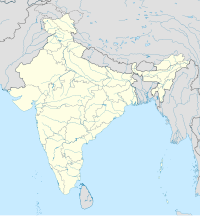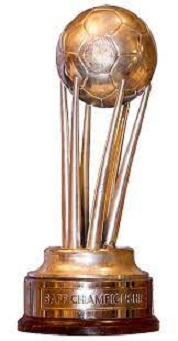
The South Asian Football Federation Championship, also known as SAFF Championship, is the main international association football competition of the men's national football teams governed by the South Asian Football Federation (SAFF). All eight teams are eligible to compete in tournament.

The India national under-17 football team represents India in international football at the under-17 level. Controlled by the All India Football Federation, the governing body for football in India, the team is part of the Asian Football Confederation and the South Asian Football Federation.
Mohamed Zilaal is a Maldivian retired basketball player. He is regarded by both peers and contemporaries as the greatest Maldivian player of his generation. In 16 professional seasons, Zilaal accumulated more championship medals and individual achievement awards than any other player in history. He also retired with the most starts, minutes and points for the Maldives senior men's national basketball team, including captaining the team to its best result to date in international competition – a silver medal in the 2016 SABA Qualification Tournament in Bangalore, India. He made his international debut while still in school. Standing at 5 ft 8 in, Zilaal played both point guard and shooting guard. Mohamed Zilaal, commonly known as Zila, was scouted heavily while still in secondary school in Majeediyyaa School in Male'. His early mentorship and coaching was overseen by the then Maldives coaches Shiyam and Ilyas and Supun Wimal of Sri Lanka. After playing one tournament for Unitours, he joined Victory Sports Club, with whom he won the national tournament 6 times out of 8 seasons. He was a vital cog in the Maldives senior men's national basketball team from his final year in school all the way up to his retirement in 2019. After playing one successful seasons for the then newly formed T-Rex Basketball Club, Zilaal transferred to then newly promoted Red Line Club (RLC). He would go on to spend four successful seasons at RLC before joining Kings Basketball Club upon its formation in 2017. Throughout his 3-year stint at Kings BC, he would captain the team in every single season, while adding to his record breaking collection of winners' and top 5 players' medals. Immediately after leading Kings BC to its first National Basketball Tournament success in 2018, Zila announced that the 2019 season would be his 16th and final as a player, both for club and country. In his final season, he would end his domestic career by carrying Kings BC to an undefeated triumph in the MBA Championship, followed by a packed schedule of international tournaments and tours, representing his country as captain in every single game until he hung up his sneakers in December 2019. From the early stages of his playing career, Zilaal was heavily involved in the youth development programmes of the Maldives Basketball Association (MBA), through which he completed FIBA Coaching certifications and refresher courses, including a Level-2 licenses, and continued to train children and youths, including assignments as Head Coach of Iskandar School in domestic interschool tournaments, as well as through the Ballers Academy, of which he was a co-founder. He continues to be active in coaching even after his 2019 retirement.
The SABA Championship is a basketball tournament for national teams organized by the South Asia Basketball Association, a sub-zone of the FIBA Asia. It serves as a qualifier for various FIBA Asia events such as the FIBA Asia Championship and the FIBA Asia Cup.
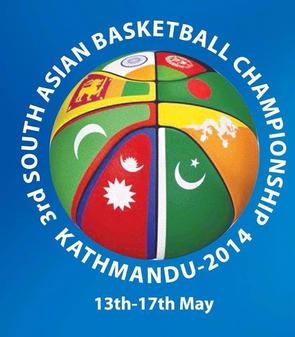
The 2014 SABA Championship is the 3rd SABA Championship, and the qualifying event in the South Asia Basketball Association subzone, one of the FIBA Asia's subzone for the 2014 FIBA Asia Cup. The games were held from May 13 to May 17 in Kathmandu, Nepal.

The 2015 FIBA Asia Championship was the 28th and last edition of the FIBA Asia Championship in men's basketball in Asia. It was organised by FIBA Asia.
Qualification for the 2015 FIBA Asia Championship was held to determine the participants in the 2015 FIBA Asia Championship. China secured qualification by being named as hosts. The other fifteen berths were disputed per FIBA Asia zone, and via the 2014 FIBA Asia Cup.
The 2014 FIBA Asia Under-18 Championship qualification was held in late 2013 and early 2014 with the Gulf region, West Asia, Southeast Asia, East Asia, Central Asia and South Asia each conducting tournaments.
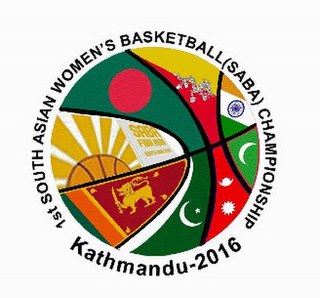
The 2016 SABA Women's Championship was the 1st SABA Women's Championship. The tournament was held from 29 March to 2 April in Kathmandu, Nepal. Five (5) teams are reported to join the women's maiden tournament for SABA subzone, one of FIBA Asia's subzone. India, Pakistan and Afghanistan were reportedly not seeing action in the five-day competition.
Qualifying for the 2016 FIBA Asia Challenge is currently being held to determine the eight teams that will participate in the 2016 FIBA Asia Challenge, aside from the host team Iran and 2015 FIBA Asia Championship winners China. Qualification is via FIBA Asia zone, with each zone having an automatic one berth, plus additional berths from the teams' zones of the second and third runners-up in the 2015 FIBA Asia Championship.
The 2016 SABA Championship was the 5th SABA Championship, and the qualifying event in the SABA subzone, one of the FIBA Asia's subzone for the 2016 FIBA Asia Challenge. The games were held from 6 July to 8 July in Bengaluru, India.
The 2017 FIBA Asia Under-16 Championship for Women was the qualifying tournament for FIBA Asia at the 2018 FIBA Under-17 World Championship for Women. Originally slated to be held at Hyderabad, the tournament venue was moved and held in Bengaluru, India from October 22 to 28.
Qualification for the 2017 FIBA Asia Cup were held to determine the participants in the 2017 FIBA Asia Cup. Lebanon secured qualification by being named as hosts. The other fifteen berths were disputed per FIBA Asia zone, and via the 2016 FIBA Asia Challenge.
The 2017 FIBA Asia Champions Cup was the 26th staging of the FIBA Asia Champions Cup, the international basketball club tournament of FIBA Asia. The tournament took place in Chenzhou, China from 22 September to 30 September 2017. This was the second straight year that China hosted the tournament.
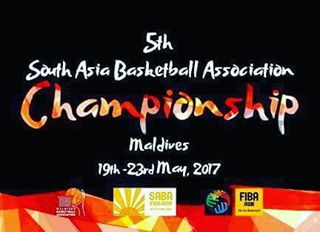
The 2017 SABA Championship is the 6th SABA Championship, and the qualifying event in the SABA sub-zone, one of the FIBA Asia's subzone for the 2017 FIBA Asia Cup and 2019 FIBA Basketball World Cup Asian Qualifiers. The games were held from 19 to 23 May in Malé, Maldives. India successfully defended their SABA crown after sweeping the whole tournament. With this win, they qualified for the 2017 FIBA Asia Cup and the first round of the 2019 FIBA Basketball World Cup Asian Qualifiers. The tournament followed a single round robin format.
The 2018 FIBA U18 Women's Asian Championship was the qualifying tournament for FIBA Asia at the 2019 FIBA U19 Women's Basketball World Cup. The tournament, which was also the 24th edition of the biennial competition, was held in Bangalore, India from 28 October to 3 November. The top four teams qualified and will represent FIBA Asia in the 2019 FIBA U19 Women's Basketball World Cup in Thailand.

The 2022 FIBA Asia Cup qualification was a basketball competition that was played from February 2018 to August 2021, to determine the fifteen FIBA Asia-Oceania nations who would join the automatically qualified host Indonesia at the 2022 FIBA Asia Cup.
The 2018–19 season is the 131st competitive association football season in India.
The 2019 FIBA Under-16 Asian Championship was originally to be the qualifying tournament for FIBA Asia at the 2020 FIBA Under-17 Basketball World Cup. The tournament would have been held in Beirut, Lebanon from 5 to 12 April 2020. The top four teams would have represented FIBA Asia at the Under-17 Basketball World Cup in Bulgaria. However it was cancelled by FIBA due to the coronavirus pandemic in China. Instead it was determined by FIBA rankings.
The 2021 SABA Championship was the 8th SABA Championship, and also known as Bangabandhu 6th South Asian Basketball Championship. The games were held from 15 to 19 November in Dhaka, Bangladesh. Aside from the host country, other confirmed participants are from India, Sri Lanka and Maldives.
